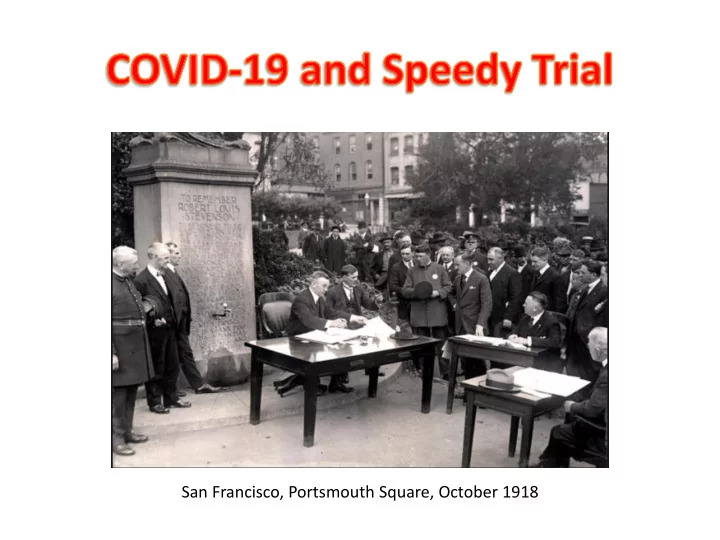

San Francisco, Portsmouth Square, October 1918
6 th Amendment In all criminal prosecutions, the accused shall enjoy the right to a speedy and public trial, by an impartial jury of the State and district where in the crime shall have been committed, which district shall have been previously ascertained by law, and to be informed of the nature and cause of the accusation; to be confronted with the witnesses against him; to have compulsory process for obtaining witnesses in his favor, and to have the Assistance of Counsel for his defence.
6 th Amendment In all criminal prosecutions, the accused shall enjoy the right to a speedy and public trial, by an impartial jury of the State and district where in the crime shall have been committed, which district shall have been previously ascertained by law, and to be informed of the nature and cause of the accusation; to be confronted with the witnesses against him; to have compulsory process for obtaining witnesses in his favor, and to have the Assistance of Counsel for his defence.
6 th Amendment In all criminal prosecutions, the accused shall enjoy the right to a speedy and public trial, by an impartial jury of the State and district where in the crime shall have been committed, which district shall have been previously ascertained by law, and to be informed of the nature and cause of the accusation; to be confronted with the witnesses against him; to have compulsory process for obtaining witnesses in his favor, and to have the Assistance of Counsel for his defence.
Barker v. Wingo (1972): No bright-line rule for what constitutes a speedy trial right violation. Instead, look to various factors: 1. Length of delay 2. Reason for delay 3. Defendant’s demands (or lack thereof) 4. Prejudice to the defendant a) Oppressive pretrial incarceration? b) Anxiety and concern? c) Impaired trial defense?
Federal Speedy Trial Act – 18 U.S.C. § 3161 (b) Any information or indictment charging an individual with the commission of an offense shall be filed within thirty days from the date on which such individual was arrested or served with a summons… (c)(1) …[T]he trial … shall commence within seventy days from the filing date (and making public) of the information or indictment, or from the date the defendant has appeared before a judicial officer of the court in which such charge is pending… “Ends of Justice” Order (h) The following periods of delay shall be excluded in computing the time …: (7) (A) … findings that the ends of justice served by taking such action outweigh the best interest of the public and the defendant in a speedy trial. …[and] the court sets forth … its reasons ….
FRCrimP 48. Dismissal. (a) By the government. The government may, with leave of court, dismiss an indictment, information, or complaint… (b) By the Court. The court may dismiss an indictment, information, or complaint if unnecessary delay occurs in: (1) Presenting a charge to a grand jury; (2) Filing an information against a defendant; or (3) Bringing a defendant to trial.
Cal. Penal Code § 1382 (a) The court, unless good cause to the contrary is shown, shall order the action to be dismissed in the following cases: (1) [no information filed within 15 days] (2) [no trial within 60 days of felony arraignment]. However, an action shall not be dismissed under this paragraph if either of the following circumstances exists: (A) [“general waiver” by defendant] (B) Defendant requests a trial date after 60 days
Cal. Const. Art. I, § 15 “The defendant in a criminal cause has the right to a speedy public trial…” * Has been construed in Serna v. Superior Court (Cal. 1985) as being triggered by the filing of a criminal complaint , and requiring a showing of prejudice to the defendant.
Recommend
More recommend